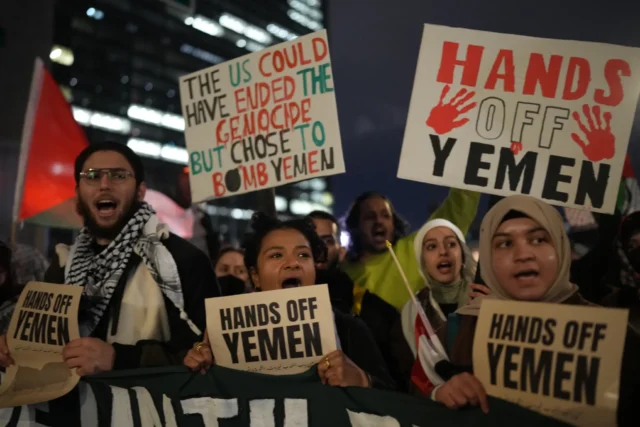“From the River to the Sea” is the chant of left-wing activists who have joined with “pro-Palestinian” (actually pro-Hamas) demonstrators in the US and Western Europe. Which river? Which sea? The few times protestors have actually been asked the question, their lack of familiarity with the issues – and the geography – have been clear. It is stupefying to see “Queers for Palestine” on placards.
Now there is a new meme.
Extolling Iranian-armed and trained Houthi terrorists who were firing on American and other shipping, kidnapping crewmen from the ships, and firing missiles at southern Israel, and have now fired on American warships, the minions in the West wave signs proclaiming, “I stand with Yemen.” And “Hands off Yemen.”
Amazon helps.
One protester told The New York Post, “The Yemeni people and the Palestinian people are the only free people because we resist by any means necessary… As long as there is resistance in Palestine and Yemen, as long as there is a blockade on Yemen and Gaza, we will stand up to resist it.”
Really? The Houthis ARE NOT YEMEN. And the only people attacking Yemen ARE THE HOUTHIS, who were listed as a sponsor of terror by the Trump administration after an attack on a Yemeni civilian airport.
Yes, the Republic of Yemen is at war with the Houthis.
Located in the heel of the boot of the Arabian Peninsula, Yemen has an internationally recognized government in Sanaa. Its majority population is Sunni with a Shiite minority, including Houthis, mainly in the southwest. Yemen has been at war internally for centuries – based primarily on tribal, not religious designations and aided by various outside agents. The most modern incarnation began with the Houthi capture of Sanaa in 2014.
There is no reason differing tribes can’t live inside one government – after all, Texas and California do – but while Saudi Arabia and The UAE fought for the majority Sunni government, Iran saw an opportunity to support a Shiite militia in an extraordinarily important place. The mullah government has been arming and training the Houthis since 2012.
[Side note: There is evidence of Jews living in Yemen dating to the 3rd century, living in the north, near Sanaa. The majority left for Israel beginning in the late 1940s. A UN report indicated that, while there had been about 50,000 Jews in Yemen until the middle of the 20th century, there was exactly one Jewish person left in March 2022.]
A Council on Foreign Relations report in 2022 deemed Yemen the world’s worst humanitarian crisis. The UN estimates that 377,000 people were killed as of the beginning of 2022 and 21.6 million Yemenis are presently in dire need of assistance. [Compare this to Gaza if you like; or don’t.] All sides of the conflict are reported to have violated human rights and international humanitarian law. The US has provided approximately $5.4 billion in humanitarian assistance to Yemen with another $444 million in the offing for this year.
In one of his first official policy decisions in February 2021, President Joe Biden announced he was lifting the terror designation from the Houthis. He was oddly clear: “This decision has nothing to do with our view of the Houthis and their reprehensible conduct, including attacks against civilians and the kidnapping of American citizens. We are committed to helping Saudi Arabia defend its territory against further such attacks.”
So, the Houthis are acknowledged to behave like a terror organization, and their “reprehensible conduct” includes the use of child soldiers, but the Biden administration ignored it.
The Houthis increased their attacks on international shipping and Iran was prompted to expand its assistance to its proxy. A US National Security Council spokesperson said, “Iranian-provided tactical intelligence has been critical in enabling Houthi targeting of maritime vessels since the group commenced attacks in November,” adding that the drones and missiles the Houthis have been using for the attacks were also provided by Iran.
After more than 100 Houthi attacks since October, the US plus the UK have taken the first serious steps to make them pay for international terrorism and piracy. We have done it before. When pirates raided ships off the coast of Somalia in the earlier part of the century, a coalition of nearly 30 countries from the US to Europe to Asia to Africa rotated through The Combined Task Force” to stop them. And the coalition was successful.
Houthi attacks on shipping – and now on the US military in the Red Sea – are no less a threat to the world economy than the pirates were, and Iran’s support for those attacks cannot be tolerated. An American military response is legitimate and necessary.
If protesters want to stand with Houthi terrorism on land and at sea, so be it – but they ought to change the meme.


